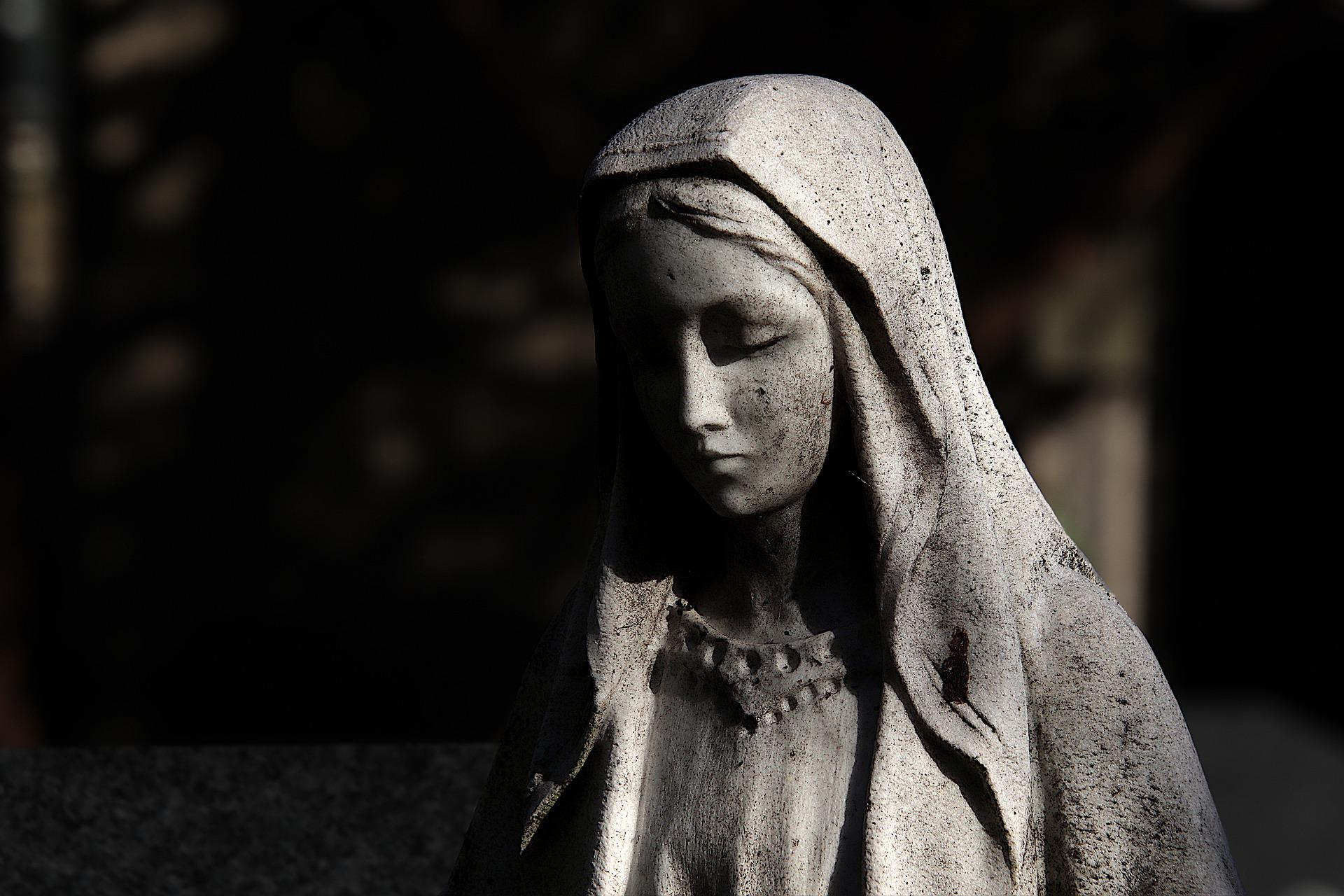- All
- Wisdom
- We Stand on Their Shoulders
- Vocation
- Uncategorized
- Stories Seldom Heard
- Spirituality
- Social Justice
- Prayer
- Peace
- Oneness
- Love
- Letting Go
- Lent
- Joy
- Inspirational Images
- Hope / Healing
- Holy Week
- Gratefulness
- God's Presence
- General News Stories
- Forgiveness
- Finding God
- Faith
- Easter
- Dominican Saints
- Discipleship
- Courage
- Christmas
- Catholic Sisters Week
- Care of the Earth
- Blessing
- Beauty
- Advent
- #justiceOPportunity
A Prophetic Woman: A Prophet’s Prayer
Sr. Patricia Bruno, OP

278th Edition September 2022
A Prophetic Woman: A Prophet’s Prayer
Luke 1: 43-54 The Magnificat
This is the irrational season
when love blooms bright and wild.
Had Mary been filled with reason
there’d have been no room for the child (1).
 August and September are months that we celebrate special feast days of Mary. August 15 is the Feast of the Assumption and on September 8 we celebrate Mary’s birthday. One of the prayers that celebrates Mary’s life and her trust in God is the Magnificat. It is not only a prayer of praise and faith but also a revolutionary prayer. I suggest before you read this article that you read the Magnificat slowly and pray it as your own prayer to God. Perhaps you might stop and name what God has done for you. How has God shown strength in your life?
August and September are months that we celebrate special feast days of Mary. August 15 is the Feast of the Assumption and on September 8 we celebrate Mary’s birthday. One of the prayers that celebrates Mary’s life and her trust in God is the Magnificat. It is not only a prayer of praise and faith but also a revolutionary prayer. I suggest before you read this article that you read the Magnificat slowly and pray it as your own prayer to God. Perhaps you might stop and name what God has done for you. How has God shown strength in your life?
My soul proclaims the greatness of God and my spirit rejoices in God my savior for God has blessed me: a poor and serving woman. From this day, all generations shall call me blessed for you who are mighty and have done great things for me. Holy is your name. Your mercy is on those who love you from generation to generation. You have shown strength with your arms. You have scattered the proud from their fantasy. You have put down the mighty from their thrones and have lifted up the powerless. You have filled the hungry with good things and have sent the rich away empty. You, remembering your mercy, have helped your people everywhere. As you promised Abraham and Sarah mercy to their children forever.
In this prayer, Mary of Nazareth, speaks with God’s authority. She sings God’s praises. Her song is so well known that it has been put to music, danced in liturgies, chanted daily as part of the official prayers of the church, and prayed reverently in our homes. Mary’s spirit rejoices in God her savior. She speaks for the poor and reminds us that the promises God makes to the poor are not for some far-off time. How do our spirits rejoice? How has God fed us in every generation and feeds us now?
Mary of Nazareth praises God who scatters the proud, brings down the haughty from their thrones, fills the hungry with good things, and lifts the oppressed. Mary, in her life, experienced the God of reversals, the God of surprises. Her song encourages us to be as trusting. She encourages us to look for the reversals in our lives. Mary trusted in God’s promises and her prayer encourages us to do the same.
Dietrich Bonhoeffer, the German theologian who was killed by the Nazis, says, “This (Mary) is not a gentle, tender, dreamy Mary whom we sometimes see in paintings; this is a passionate, surrendered, proud, enthusiastic Mary who speaks out.” She sings a “hard, strong, inexorable song about collapsing thrones and humbled lords of this world, about the power of God and the powerlessness of humankind. These are the tones of the women prophets of the Old Testament that now come to life in Mary’s mouth” (1).
“Over the years there have been many debates discussing the origin of Mary’s Magnificat. Some connect its origin with the Song of Hanna from the First Book of Samuel (1Sam. 2: 1-10). Other scholars suggest that it was written by the early church in Jerusalem. Still, others argue that it was addressing the political struggle of the people of Palestine against their Roman oppressors. There is merit to all of these ideas and certainly to the discussions they evoke. But for our purpose, we don’t have to choose sides in this debate. What comes through clearly is that “people in need in every society hear a blessing in this canticle. The battered woman, the single parent without resources, those without food on their table or without even a table, the homeless family, the young abandoned to their own devices, the old who are discarded — all who are subjected to social contempt are encompassed in the hope Mary proclaims” (2). And, yes, even we who might not fall into the categories I just named, find hope as we struggle to live justly and mercifully in our daily decisions and actions.”
Mary’s Magnificat, her song of joy and hope, has echoed throughout every land and century. We in the US might not always recognize the revolutionary quality of this prayer, but in other countries, it has been heard and acknowledged. In the 1980s the Magnificat was banned from public worship in Guatemala because the government of Guatemala recognized its subversive message. The Peruvian theologian Gustavo Gutierrez, a Dominican Friar, reminds us that this song of praise underlines God’s preferential love of the lowly and the abused. God is on the side of the poor and lowly not because they are holier than other people, but because no one else will stand with them or speak on their behalf. God is on the side of the poor because God desires everyone to be justly treated.
The Magnificat is a prayer for every person and for all seasons of our lives. It is a prayer that helps focus our attention on what is important and what God desires of us. Along with Mary we too have been called to be prophets of justice, mercy, and compassion. If we listen carefully to the circumstances of our lives and pay attention to the Spirit’s guidance in prayer and conversation, we will be graced to walk our own prophetic path in our unique circumstances. To say we have a “prophetic mission” might sound a bit highfalutin. But when we remember that it is not our mission, but God’s mission and God’s grace, our prophetic vocation feels more possible. Put in everyday language “prophetic mission” means living in right relationship with others and God. In other words, it is biblical justice. It is “both-and.” It is a matter of prayer and being truly engaged with our world.
For sure it is a slow process. It requires daily reflection on our actions and our circumstances because biblical justice is different from our contemporary understanding of justice as it is seen in our legal system. Biblical justice is concerned with the common good and the special care of the most vulnerable in society. In a world that is marked by so many conflicts and intolerable social and economic inequalities, Pope John Paul II often reminded us of our need for individual and corporate conversion.
In the New Testament, justice is Lady Justice. Lady Justice is not symbolized by the image we often see depicted on the walls of a courthouse building. She is not a blindfolded woman with scales in her hands. Rather Lady Justice in the New Testament can see, hear and speak. Like Mary of Nazareth, Lady Justice speaks as God’s servant and friend. I wonder what changes would take place in each of us if we were to pray the Magnificat each day as an examination of conscience? I wonder if we read it slowly and reflected on it, would it give us the courage we need to face the small and large issues of injustice in our lives? Would praying this revolutionary prayer each day strengthen our tenacity and encourage us to work for social and economic change, confident that our works are not in vain or too little to make a difference? What if we prayed this prayer with others? Would it, could it, strengthen our faith and hope that through our collective actions God’s vision for us might become more a reality in our lives? Would praying the Magnificat help us feel the joy that Mary expresses?
The Magnificat reminds us that God works in ordinary people’s lives in mysterious ways. Never underestimate our God who desires that “kindness and truth shall meet, and justice and peace shall kiss” (Ps. 85: 10).
1. Madeleine L’Engle’s poem “After Annunciation,” A Cry Like a Bell, Crosswicks, 1987. p. 58.
2. Johnson, Elizabeth, Truly Our Sister, Continuum International Publishing Group Inc, New York, London, 2003. p 267
3. Johnson, p. 269
